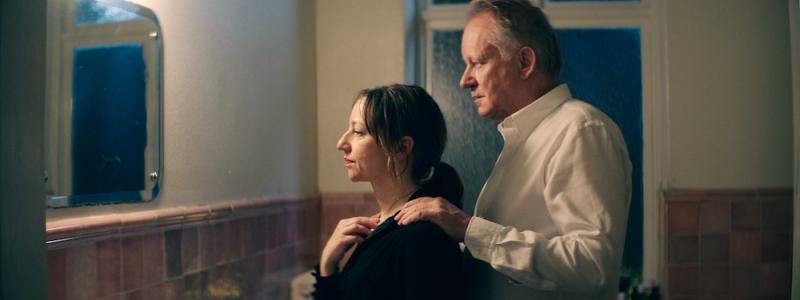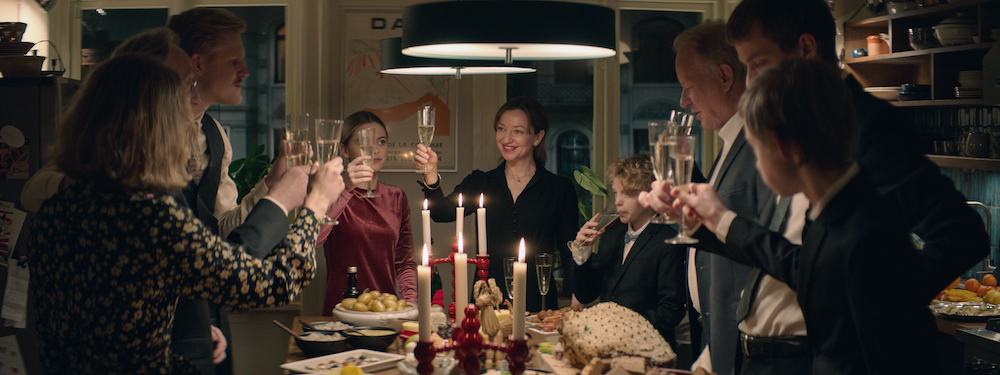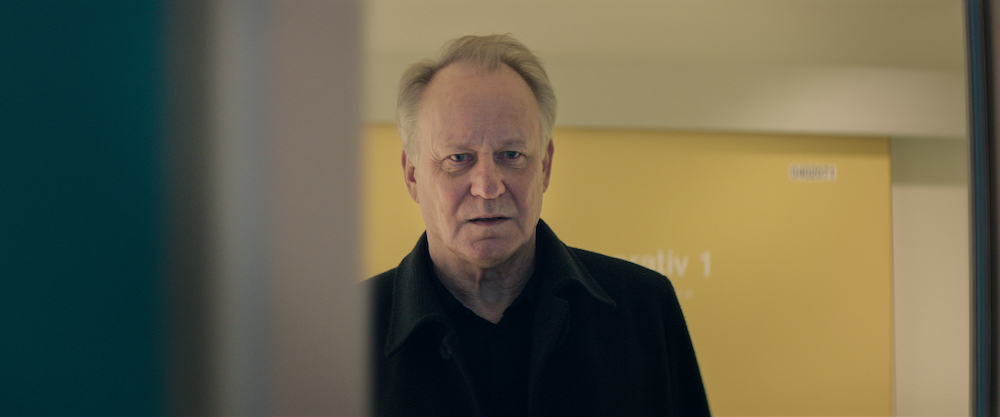Hope review - brilliance and honesty from Norwegian director Maria Sødahl | reviews, news & interviews
Hope review - brilliance and honesty from Norwegian director Maria Sødahl
Hope review - brilliance and honesty from Norwegian director Maria Sødahl
Dealing with a cancer diagnosis: no sentimentality and superb performances

The story of a woman with lung cancer that has metastasised to the brain is based on Norwegian director Maria Sødahl's own experience, which is a hopeful sign in itself.
It’s Christmas and comfort and joy is thin on the ground. Oslo choreographer Anja (the brilliant, vibrant Andrea Bræin Hovig) is desperate to avoid a repeat of last year, when she was in hospital, away from her six children – three of her own, three step - undergoing apparently successful surgery for lung cancer.
But now her persistent headaches and dizziness are accompanied by an awful inability to read – she can’t even see the caller ID on her phone. These are symptoms of a brain tumour, incurable and possibly leaving her with little time left. As she gets the ominous phone call from the doctor, she’s making up her father’s bed – he’s staying with them for the holidays - on the sofa. In the mirror, she watches her teenage daughter putting on make-up. It’s a scene that sums up so much about life and its trajectory. Anja’s life, from this grim viewpoint, starts to seem to her like a PowerPoint presentation featuring a “thick grey graph of postpartum apathy” with her partner Tomas (Stellan Skarsgård, pictured below) as a series of dots, coming and going. “Uplifting,” he says wryly. He’s a theatre director, an unavailable, distant, workaholic sort and it’s a measure of Skarsgård’s skill that the powerful emotions beneath his slow-moving facial expressions, like a roiling river running below the surface, come over so clearly.
Anja’s life, from this grim viewpoint, starts to seem to her like a PowerPoint presentation featuring a “thick grey graph of postpartum apathy” with her partner Tomas (Stellan Skarsgård, pictured below) as a series of dots, coming and going. “Uplifting,” he says wryly. He’s a theatre director, an unavailable, distant, workaholic sort and it’s a measure of Skarsgård’s skill that the powerful emotions beneath his slow-moving facial expressions, like a roiling river running below the surface, come over so clearly.
Anja is the opposite, made manic, sleepless, often furious and ravenously hungry by the high doses of steroids she’s been prescribed “to avoid brain death,” as one doctor puts it, delicately. “She’s so volatile and intense,” says Tomas to a friend. “I don’t know what’s the medication, what’s her fear of dying and what’s just Anja.”
The action takes place over several days, each given a date-line chapter heading, starting with the day before Christmas Eve and ending on 2 January, when Anja’s surgery is eventually, triumphantly scheduled. “It’s like we’re at work together in a whole new field,” says Anja grimly, fighting nausea by munching a wrap, as she and Tomas stride through hospital corridors trying to negotiate the healthcare system. Even in Norway, finding the right brain surgeon or someone experienced enough to give advice about how to break the news to the children is an uphill struggle over Christmas.
Their relationship, in all its imperfection, is wonderfully authentic, as are the domestic details of a family Christmas, sometimes quarrelsome, sometimes tearful, that carries on regardless, with great ensemble acting from the six children. For Anja and Tomas, work has taken precedence over the years and intimacy has fallen by the wayside. There's a pragmatic coolness about the family dynamic. Do they love each other? Good question, complicated answer. “We’re useless at sticking together even when times are good,” says Anja bitterly. But now she’s determined to give her children – the youngest, a tousle-headed boy, is 10, while Tomas’s, from his previous marriage, are in their twenties – something new to believe in that will sustain them when she’s gone.
Do they love each other? Good question, complicated answer. “We’re useless at sticking together even when times are good,” says Anja bitterly. But now she’s determined to give her children – the youngest, a tousle-headed boy, is 10, while Tomas’s, from his previous marriage, are in their twenties – something new to believe in that will sustain them when she’s gone.
At first, rage takes over and Anja doesn’t mince words. Find someone else quickly because, “I don’t think the kids will make it with you alone,” she tells Tomas damningly. And, she adds, she’s always loved her own kids more then his, even though, misguidedly, she’s pretended not to. But then there’s a softening, a new tenderness, even romance, as they join forces, first for the children’s sake, then their own. Tomas’s new best friend, he says, is PubMed.com. He’s able to help her more than she ever imagined. And at the end, we’re left with hope.
rating
Explore topics
Share this article
The future of Arts Journalism
You can stop theartsdesk.com closing!
We urgently need financing to survive. Our fundraising drive has thus far raised £49,000 but we need to reach £100,000 or we will be forced to close. Please contribute here: https://gofund.me/c3f6033d
And if you can forward this information to anyone who might assist, we’d be grateful.

Subscribe to theartsdesk.com
Thank you for continuing to read our work on theartsdesk.com. For unlimited access to every article in its entirety, including our archive of more than 15,000 pieces, we're asking for £5 per month or £40 per year. We feel it's a very good deal, and hope you do too.
To take a subscription now simply click here.
And if you're looking for that extra gift for a friend or family member, why not treat them to a theartsdesk.com gift subscription?
more Film
 Can I get a Witness? review - time to die before you get old
Ann Marie Fleming directs Sandra Oh in dystopian fantasy that fails to ignite
Can I get a Witness? review - time to die before you get old
Ann Marie Fleming directs Sandra Oh in dystopian fantasy that fails to ignite
 Happyend review - the kids are never alright
In this futuristic blackboard jungle everything is a bit too manicured
Happyend review - the kids are never alright
In this futuristic blackboard jungle everything is a bit too manicured
 Robert Redford (1936-2025)
The star was more admired within the screen trade than by the critics
Robert Redford (1936-2025)
The star was more admired within the screen trade than by the critics
 Blu-ray: The Sons of Great Bear
DEFA's first 'Red Western': a revisionist take on colonial expansion
Blu-ray: The Sons of Great Bear
DEFA's first 'Red Western': a revisionist take on colonial expansion
 Spinal Tap II: The End Continues review - comedy rock band fails to revive past glories
Belated satirical sequel runs out of gas
Spinal Tap II: The End Continues review - comedy rock band fails to revive past glories
Belated satirical sequel runs out of gas
 Downton Abbey: The Grand Finale review - an attemptedly elegiac final chapter haunted by its past
Noel Coward is a welcome visitor to the insular world of the hit series
Downton Abbey: The Grand Finale review - an attemptedly elegiac final chapter haunted by its past
Noel Coward is a welcome visitor to the insular world of the hit series
 Islands review - sunshine noir serves an ace
Sam Riley is the holiday resort tennis pro in over his head
Islands review - sunshine noir serves an ace
Sam Riley is the holiday resort tennis pro in over his head
 theartsdesk Q&A: actor Sam Riley on playing a washed-up loner in the thriller 'Islands'
The actor discusses his love of self-destructive characters and the problem with fame
theartsdesk Q&A: actor Sam Riley on playing a washed-up loner in the thriller 'Islands'
The actor discusses his love of self-destructive characters and the problem with fame
 Honey Don’t! review - film noir in the bright sun
A Coen brother with a blood-simple gumshoe caper
Honey Don’t! review - film noir in the bright sun
A Coen brother with a blood-simple gumshoe caper
 The Courageous review - Ophélia Kolb excels as a single mother on the edge
Jasmin Gordon's directorial debut features strong performances but leaves too much unexplained
The Courageous review - Ophélia Kolb excels as a single mother on the edge
Jasmin Gordon's directorial debut features strong performances but leaves too much unexplained
 Blu-ray: The Graduate
Post #MeToo, can Mike Nichols' second feature still lay claim to Classic Film status?
Blu-ray: The Graduate
Post #MeToo, can Mike Nichols' second feature still lay claim to Classic Film status?

Add comment